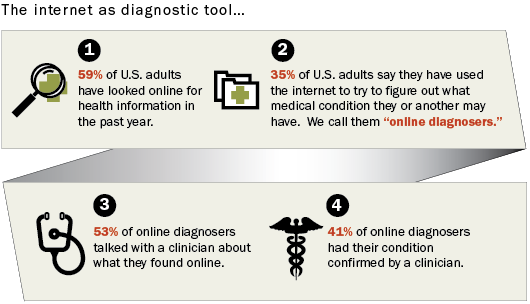Pew Research Finds 35% Americans are ‘Online Diagnosers’
The Pew Internet & American Life Project is one of seven projects comprising the Pew Research Center, non-profit “fact tank” providing information on trends that shape our life. The Project makes available its research and reports on a broad range of topics including healthcare. Yesterday Project released their latest report, Health Online 2013.
The Pew research looks at how adults in the U.S. use health information online to figure out a medical condition for themselves or someone else. The Pew research also updates the Pew Internet Project trends related to the social media aspect of health information as well as peer-to-peer healthcare. The report found most Americans do look online for health information with 35% using the Internet as an actual diagnostic tool. Pew Research refers to these users as “Online Diagnosers.” But the report also indicates that patients still rely on their doctors as the primary source for diagnostic, guidance and treatment information.
Key findings from the pew research address how online diagnosers use the Internet before and after their search. When online diagnosers were asked if the information found online led them to think they needed medical attention, 45% said yes.

When online diagnosers were asked about the accurracy of their initial online diagnosis, the respondents reported:
- 41% of online diagnosers say a medical professional confirmed their diagnosis. An additional 2% say a medical professional partially confirmed it.
- 35% say they did not visit a clinician to get a professional opinion.
- 18% say they consulted a medical professional and the clinician either did not agree or offered a different opinion about the condition.
- 1% say their conversation with a clinician was inconclusive.
Other findings from the Pew research suggest women are more likely than men to go online to search for a possible diagnosis. Other demographics of the online diagnoser included younger people, white adults, those who live in households earning $75k or more those with a college degree or advanced degrees.
The report states: “It is important to note what these findings mean – and what they don’t mean. Historically, people have always tried to answer their health questions at home and made personal choices about whether and when to consult a clinician. Many have now added the internet to their personal health toolbox, helping themselves and their loved ones better understand what might be ailing them. This study was not designed to determine whether the internet has had a good or bad influence on health care. It measures the scope, but not the outcome, of this activity.”
Finally, the Pew research results still show that clinicians are the central resource for information for serious health issues and care and that these clinician-patient conversations and interactions generally occur offline. When respondents were asked to think about their last serious health issue 70% said they turned to their doctor or health care professional for information and care.
Read the full Pew Research report here.
